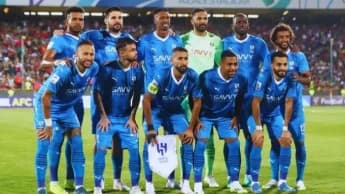Al-Ittihad Club: A Legacy of Triumph, Resilience, and Unforgettable Moments

From humble beginnings to continental glory, Al-Ittihad’s journey is a testament to passion, perseverance, and the power of football to unite a nation.
Al-Ittihad Club, one of the most historic and successful football clubs in Saudi Arabia, has built a legacy defined by moments of triumph, resilience, and unforgettable achievements. Founded in 1927, the club has established itself as a dominant force in both domestic and continental competitions. Over the decades, Al-Ittihad has consistently been at the forefront of Saudi football, delivering iconic performances that have shaped the club’s identity and earned it a passionate following.
From securing multiple Saudi Pro League titles to making history on the continental stage, Al-Ittihad has been a club synonymous with success. The club’s journey is filled with moments that have left an indelible mark on Saudi and Asian football. Whether through dramatic league victories, unforgettable cup runs, or remarkable displays of determination in international tournaments, Al-Ittihad’s history is rich with defining moments.
Early Years and Foundation
Al-Ittihad Club, one of the most prestigious and historically significant football clubs in Saudi Arabia, was founded in 1927, making it the oldest football club in the country. The club's origins can be traced back to a group of young sports enthusiasts in Jeddah who shared a passion for football. During that time, football was still in its early stages in Saudi Arabia, with no structured leagues or organized competitions. However, the game was gaining popularity, particularly among the youth, and informal matches were frequently played in open spaces across Jeddah.
The idea of forming a football club emerged when a group of local players and sports lovers convened to establish a team that could compete in organized matches. Among the founding members were influential figures such as Hamza Fitaihi, one of the key personalities responsible for structuring the club in its early years. Their primary goal was to create a competitive team that could represent Jeddah in football matches, and their vision soon materialized into the establishment of Al-Ittihad Club.
From the very beginning, Al-Ittihad adopted a distinctive style of play that reflected the raw talent and enthusiasm of its early players. The club quickly gained recognition for its determination and commitment to the sport, earning respect among local teams. During these formative years, Al-Ittihad did not have a permanent home ground or modern training facilities, and players had to rely on their passion and dedication to the sport to improve their skills. The team played friendly matches against other local teams, gradually building a reputation as a formidable side.
As football continued to grow in Saudi Arabia, Al-Ittihad became a central figure in the sport’s development. The club played a crucial role in popularizing football in Jeddah and beyond, attracting more players and supporters. The competitive spirit of Al-Ittihad was evident in its early encounters, as it faced various teams in unofficial competitions. These matches laid the foundation for what would eventually become an organized football structure in Saudi Arabia.
During the 1940s and 1950s, Al-Ittihad began to establish itself as a dominant force in regional competitions. The club’s ability to bring together skilled players and organize structured training sessions set it apart from other teams. Although Saudi Arabia had not yet developed a professional league system, Al-Ittihad continued to play a vital role in shaping the country's football landscape. The club’s early success in regional tournaments and friendly matches contributed to its growing popularity and strengthened its identity as a leading football institution.
One of the defining moments in Al-Ittihad’s early history was its participation in the first-ever official football competition in Saudi Arabia. The team’s strong performances and dedication to the sport helped elevate the standard of football in the country. As the club continued to grow, it attracted more talented players, further enhancing its reputation as a powerhouse in Saudi football.
By the time Saudi Arabia began organizing structured domestic football competitions in the mid-20th century, Al-Ittihad was already an established club with a rich history and a loyal fanbase. The club's foundation and early years played a crucial role in shaping its long-term success, setting the stage for future achievements both domestically and internationally.
The resilience and determination demonstrated by Al-Ittihad during its formative years remain an integral part of the club’s identity today. The passion of its founding members and early players laid the groundwork for a legacy that would span generations. Al-Ittihad’s journey from a small local team to one of the most successful clubs in Asia is a testament to the strength of its foundation and the commitment of those who helped establish it.
Iconic Matches and Rivalries
Al-Ittihad Club has been at the heart of some of the most intense and unforgettable matches in Saudi Arabian and Asian football history. Over the decades, the club has developed fierce rivalries and played in high-stakes encounters that have defined its legacy. Whether in domestic competitions or on the continental stage, Al-Ittihad’s battles with its biggest rivals have captured the imagination of football fans, producing moments of brilliance, drama, and controversy.
One of the most heated rivalries in Saudi football is between Al-Ittihad and Al-Hilal, a clash often referred to as the "Saudi Clasico." These two clubs, both among the most successful in Saudi football, have engaged in numerous thrilling encounters over the years. Their matches are known for their intensity, with both teams fighting not just for points but for pride and supremacy in Saudi football. One particularly memorable meeting came in the 2004–05 Saudi Pro League season when Al-Ittihad defeated Al-Hilal in the decisive championship playoff final, securing a league title in dramatic fashion. The victory was a testament to Al-Ittihad’s resilience and ability to rise to the occasion in crucial moments.
Another historic rivalry exists between Al-Ittihad and Al-Nassr. This rivalry has produced many iconic matches, including cup finals and league deciders. The two teams have often been evenly matched, leading to fiercely contested encounters that have kept fans on the edge of their seats. In one of their most memorable clashes, Al-Ittihad defeated Al-Nassr in the 2018 King’s Cup final, securing the trophy in a thrilling contest that showcased the team’s attacking prowess and determination.
Beyond domestic rivalries, Al-Ittihad has also been involved in legendary encounters on the continental stage, particularly in the AFC Champions League. One of the most iconic matches in the club’s history came in the 2004 AFC Champions League final against Seongnam Ilhwa Chunma of South Korea. After suffering a 3–1 defeat in the first leg, Al-Ittihad produced an extraordinary comeback in the return leg, demolishing their opponents 5–0 in Jeddah to lift their first-ever continental title. The remarkable turnaround remains one of the greatest moments in Asian club football history and solidified Al-Ittihad’s reputation as a force to be reckoned with.
The following year, Al-Ittihad defended their AFC Champions League title with another unforgettable campaign. The 2005 final against UAE’s Al Ain was another defining moment, as Al-Ittihad once again proved their dominance on the Asian stage. A 5–3 aggregate victory ensured back-to-back titles, making Al-Ittihad the first club in the modern era to win consecutive AFC Champions League trophies. These triumphs elevated the club’s status in Asian football and showcased its ability to perform at the highest level.
Al-Ittihad’s rivalry with Al-Ahli, known as the Jeddah Derby, is another key fixture that has provided countless memorable encounters. The battle between the two Jeddah-based clubs is one of the fiercest in Saudi Arabia, with both sets of fans creating an electric atmosphere whenever they meet. The derby matches are often unpredictable, with moments of individual brilliance, late drama, and high emotions defining the contests. One of the most memorable Jeddah Derby matches came in the 2012–13 season when Al-Ittihad triumphed in a thrilling 4–2 victory, showcasing their attacking quality and dominance over their city rivals.
Throughout its history, Al-Ittihad has been involved in numerous high-stakes encounters that have defined its legacy. Whether in league title deciders, cup finals, or crucial continental clashes, the club has consistently delivered performances that have left a lasting impact on Saudi and Asian football. These iconic matches and rivalries have shaped the identity of Al-Ittihad, reinforcing its reputation as a club that thrives in the biggest moments and continues to captivate football fans with its rich history of memorable battles.
Challenges and Comebacks
Al-Ittihad Club has experienced numerous challenges throughout its history, facing financial crises, managerial instability, and periods of underperformance. However, time and again, the club has shown remarkable resilience, making dramatic comebacks and re-establishing itself as a dominant force in Saudi and Asian football. The ability to overcome adversity has been one of the defining characteristics of Al-Ittihad, earning the club a reputation for never giving up, no matter the obstacles.
One of the biggest challenges in Al-Ittihad’s history came in the late 1980s and early 1990s. During this period, the club struggled with inconsistency, failing to compete for major trophies as they had in previous decades. The dominance of clubs like Al-Hilal and Al-Nassr during this time made it difficult for Al-Ittihad to secure domestic titles. However, through strong leadership and investment in emerging talent, the club gradually regained its competitive edge. The resurgence culminated in the late 1990s when Al-Ittihad secured multiple Saudi Pro League titles, reclaiming its status as one of the top teams in the country.
Financial difficulties have also been a recurring issue for Al-Ittihad, particularly in the 2010s. Mounting debts, unpaid player wages, and legal disputes over contracts created a challenging environment for the club. At times, these financial troubles threatened Al-Ittihad’s ability to attract and retain top talent. Despite these setbacks, the club managed to navigate through its financial struggles with support from its passionate fan base, sponsorship deals, and assistance from Saudi football authorities. By restructuring its finances and focusing on developing young players, Al-Ittihad managed to stay competitive even during difficult periods.
Another major challenge for Al-Ittihad came in the AFC Champions League after their back-to-back triumphs in 2004 and 2005. Maintaining success on the continental stage proved to be difficult as stronger teams emerged in Asia. The club faced several heartbreaks in the tournament, including semifinal and quarterfinal exits in the years that followed. However, Al-Ittihad continued to fight for continental glory, and their determination paid off when they reached the 2009 AFC Champions League final. Although they fell short against Pohang Steelers, their journey to the final reaffirmed their status as one of Asia’s elite clubs.
Managerial instability has also posed a significant challenge for Al-Ittihad. Over the years, the club has gone through numerous coaching changes, with managers struggling to implement long-term plans. Frequent changes in tactics and playing styles led to inconsistent performances on the field. However, Al-Ittihad’s ability to find strong leadership at crucial moments helped the club bounce back from these turbulent periods. Appointing experienced managers with a clear vision allowed the team to rebuild and return to the top.
Despite these challenges, Al-Ittihad has made some remarkable comebacks that have defined its legacy. One of the most memorable came in the 2004 AFC Champions League final against Seongnam Ilhwa Chunma. After losing the first leg 3–1, Al-Ittihad produced an incredible turnaround in the second leg, winning 5–0 to lift the trophy in spectacular fashion. This victory remains one of the greatest comebacks in Asian club football history.
Another unforgettable comeback occurred during the 2018 King’s Cup final. Facing Al-Faisaly, Al-Ittihad found themselves in a tense battle, with the game going into extra time. Despite the pressure, Al-Ittihad showed their fighting spirit, securing a dramatic victory and lifting the prestigious trophy. The triumph was especially significant as it came during a period of financial struggles, proving that the club could still achieve success against the odds.
In more recent years, Al-Ittihad has continued to demonstrate resilience. After a period of underperformance in the Saudi Pro League, the club embarked on a rebuilding process, signing key players and investing in a strong squad. This led to a resurgence that saw Al-Ittihad challenge for domestic honors once again, proving that no matter the setbacks, the club always finds a way to rise again.
Al-Ittihad’s history is filled with moments of struggle, but each challenge has been met with a determined response. Whether overcoming financial difficulties, managerial instability, or tough competition, the club has consistently found ways to reclaim its place among the best. These challenges and comebacks have shaped Al-Ittihad’s identity, making it a club that thrives on adversity and continues to inspire its supporters with its fighting spirit.
Influence on Saudi Football
Al-Ittihad Club has played a pivotal role in shaping the landscape of Saudi Arabian football. As one of the oldest and most successful clubs in the country, its influence extends far beyond its own achievements, impacting the development of domestic football, the growth of fan culture, the standard of competition, and the international reputation of Saudi football. Over the decades, Al-Ittihad has set benchmarks in professionalism, talent development, and competitive excellence, inspiring generations of players and clubs across the nation.
One of the most significant ways in which Al-Ittihad has influenced Saudi football is through its sustained domestic success. The club has consistently been a dominant force in the Saudi Pro League, winning multiple league titles and domestic cup competitions. This consistent level of excellence has raised the standard of competition in Saudi football, forcing rival clubs to strengthen their squads, improve their tactical approaches, and invest in better infrastructure to keep pace with Al-Ittihad’s success. As a result, the overall quality of the league has improved, making it one of the most competitive in Asia.
Al-Ittihad has also played a crucial role in the development of young Saudi footballers. Throughout its history, the club has placed great emphasis on nurturing local talent through its youth academy and training programs. Many of Saudi Arabia’s top players have emerged from Al-Ittihad’s ranks, going on to represent the national team and compete at the highest level. By investing in youth development, Al-Ittihad has contributed to the long-term growth of Saudi football, ensuring a steady supply of talented players for both the domestic league and the national team.
The club’s impact on fan culture in Saudi Arabia is another key aspect of its influence. Al-Ittihad boasts one of the most passionate and loyal fan bases in the country. The club’s supporters, known for their unwavering dedication, have set a high standard for fan engagement in Saudi football. The electrifying atmosphere at King Abdullah Sports City during Al-Ittihad’s home matches has become a defining feature of Saudi football culture. The club’s fan base has also played a role in increasing attendance figures for domestic matches and boosting the popularity of the sport across the nation.
Al-Ittihad’s success on the continental stage has helped raise the profile of Saudi football internationally. The club’s triumphs in the AFC Champions League in 2004 and 2005 established Saudi Arabian football as a dominant force in Asian club competitions. By defeating some of the best teams from across the continent, Al-Ittihad demonstrated the strength of Saudi clubs, gaining respect and recognition on the global stage. These achievements paved the way for other Saudi clubs to compete with confidence in international tournaments, further solidifying the country’s reputation in Asian football.
Beyond its success in competitions, Al-Ittihad has influenced the evolution of Saudi football through its approach to professional management and club operations. The club has been a pioneer in adopting modern footballing practices, including player scouting, tactical innovations, and sports science. By continuously improving its organizational structure, Al-Ittihad has set an example for other clubs in Saudi Arabia to follow. The professionalization of club management has contributed to the overall development of Saudi football, making the league more attractive to sponsors, broadcasters, and international investors.
Al-Ittihad’s influence can also be seen in the growing appeal of Saudi football to international players and coaches. Over the years, the club has attracted top talents from around the world, bringing in experienced foreign players and managers to strengthen the squad. This influx of international expertise has not only improved Al-Ittihad’s performances but has also had a wider impact on the league, raising the overall standard of play and providing local players with valuable exposure to different playing styles and tactics.
Additionally, Al-Ittihad has played a role in fostering sportsmanship and competitive spirit within Saudi football. The club’s intense rivalries, particularly with Al-Hilal, Al-Nassr, and Al-Ahli, have contributed to the excitement and prestige of Saudi domestic football. These rivalries have pushed teams to perform at their best, leading to thrilling encounters that captivate fans and enhance the league’s entertainment value. The competitive nature of these matches has helped Saudi football grow into one of the most watched and followed leagues in the region.
Al-Ittihad’s influence on Saudi football is profound and far-reaching. Through its domestic success, contribution to youth development, passionate fan base, international achievements, professional management, and role in raising the league’s profile, the club has left a lasting impact on the sport in Saudi Arabia. As one of the country’s most historic and decorated clubs, Al-Ittihad continues to shape the future of Saudi football, inspiring new generations of players, fans, and clubs to strive for greatness.
Fan Culture and Legacy
Al-Ittihad Club boasts one of the most passionate and dedicated fan bases in Saudi Arabian football. The club’s supporters, known for their unwavering loyalty and vibrant matchday presence, have played a crucial role in shaping its identity and sustaining its success. From creating an electrifying atmosphere in stadiums to influencing the culture of Saudi football, Al-Ittihad’s fans have established themselves as a defining force in the club’s rich history.
One of the most striking aspects of Al-Ittihad’s fan culture is the deep emotional connection between the supporters and the team. The club’s fan base is not just limited to Jeddah, where it is based, but extends across the entire country and even beyond Saudi Arabia’s borders. Generations of supporters have followed the team through triumphs and hardships, demonstrating an unmatched level of commitment. This loyalty is evident in the way fans fill the stands at King Abdullah Sports City, creating a sea of yellow and black that serves as a powerful symbol of unity and pride.
Matchdays involving Al-Ittihad are known for their intense and electrifying atmosphere. The club’s supporters bring unmatched energy to every game, with organized chants, drumming, and flag-waving becoming an integral part of the experience. The coordinated efforts of fan groups, such as the club’s official supporters’ association, help create a charged environment that inspires the players and intimidates opponents. This passionate support has made Al-Ittihad’s home ground one of the most difficult venues for visiting teams in Saudi Arabia.
The club’s legacy is also deeply intertwined with its fierce rivalries, particularly with Al-Hilal, Al-Nassr, and city rivals Al-Ahli. These high-stakes matches are some of the most anticipated events in Saudi football, drawing huge crowds and generating widespread






